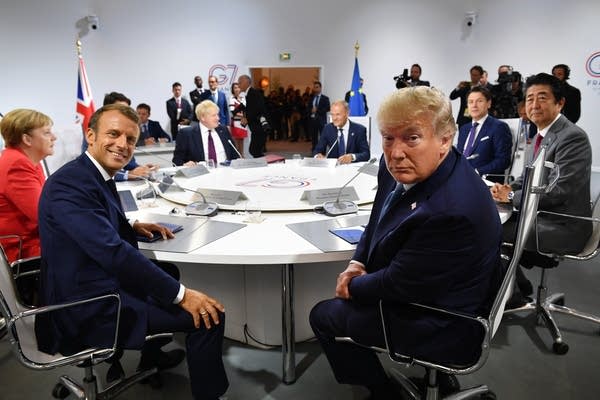Trump, Macron hold joint news conference at G-7 summit

Go Deeper.
Create an account or log in to save stories.
Like this?
Thanks for liking this story! We have added it to a list of your favorite stories.
U.S. President Donald Trump said he gave his approval for Iran's top diplomat to make an unannounced appearance on the margins of the G-7 summit, denying Monday that he was surprised or angered and claiming "unity" with the other leaders.
French President Emmanuel Macron's invitation to Iranian Foreign Minister Mohammad Javad Zarif was a bold gamble that he could secure a breakthrough in global tensions over Iran's nuclear program.
Macron, the host of the Group of Seven gathering in the seaside resort of Biarritz, and other G-7 leaders opposed Trump's decision last year to pull the United States out of a nuclear deal with Iran and to impose new sanctions. They have been trying to salvage the painstakingly negotiated treaty ever since.
Trump would not say if any Americans met with Zarif during the foreign minister's brief time in Biarritz on Sunday. Some of the U.S. sanctions directly target Zarif.
Turn Up Your Support
MPR News helps you turn down the noise and build shared understanding. Turn up your support for this public resource and keep trusted journalism accessible to all.
"It's all very new," Trump said.
Tensions over Iran, Russia, the U.S. trade war with China and the faltering global economy have dominated the three-day summit, which Trump and Macron are set to finish with a joint news conference Monday.
Macron announced the leaders had agreed to a $20 million fund to help South American countries fight unprecedented fires in the Amazon, as well as a long-term global initiative to protect the rainforest there and potentially in Africa.
The French leader's announcement came after a late morning session on the climate that Trump skipped.
He and the other leaders of the G-7 countries, which also include Germany, Britain, Canada, Italy and Japan, have sidestepped their differences with Trump, known for his short fuse and skepticism of international cooperation.
Macron was careful to note that Trump sent aides to the climate session, which the French president led.
Seated alongside German Chancellor Angela Merkel, Trump claimed "great unity" among the leaders on the subject of Iran.
"We've come to a conclusion, more or less. But the biggest part of the conclusion: They can't have nuclear weapons," he said.
That conclusion was one world leaders reached long ago and the purpose of the 2015 accord, which took years to negotiate.
It was not clear when precisely Macron extended the invitation to Zarif or when he informed the others that the Iranian was on his way. Trump said he and Macron spoke directly.
The French president's office said everything came together in a matter of hours.
"I said if you want to do that, that's OK. I don't consider that disrespectful at all. Especially when he asked me for approval," Trump said.
In a televised speech, Iranian President Rouhani also appeared on the defensive, shielding his foreign minister against criticism from hard-liners who have rejected negotiations until sanctions are lifted. Iran's economy has nosedived since the U.S. imposed new sanctions.
"If I knew that going to a meeting and visiting a person would help my country's development and resolve the problems of the people, I would not miss it," Rouhani said. "Even if the odds of success are not 90 percent but are 20 or 10 percent, we must move ahead with it. We should not miss opportunities."
Merkel said an achievement of the G-7 summit was an agreement to block Iran from having nuclear weapons "by political means." She would not list any specifics.
"What will come out of this, what possibilities will open up, we can't say today. But the firm will to talk is already great progress," she told German television.
Macron has said the summit will end without a final joint statement, hoping to avoid last year's disastrous gathering in Canada when Trump repudiated his signature shortly after leaving and tweeted criticism of the host, Canadian Prime Minister Justin Trudeau.
But officials were expecting more limited agreements on issues such as coordinating taxes on the digital business of tech giants, which Trump said was nearing agreement after his threats of retaliatory tariffs on French wine.


